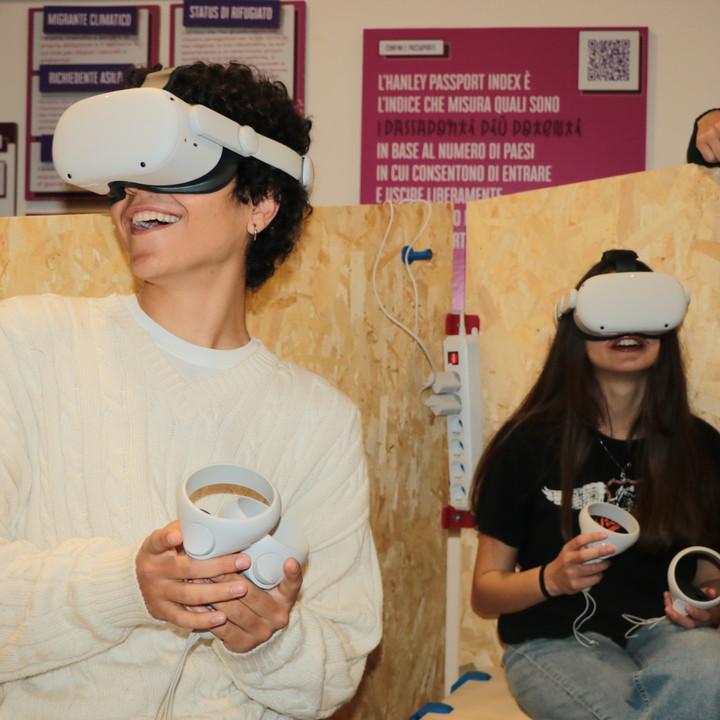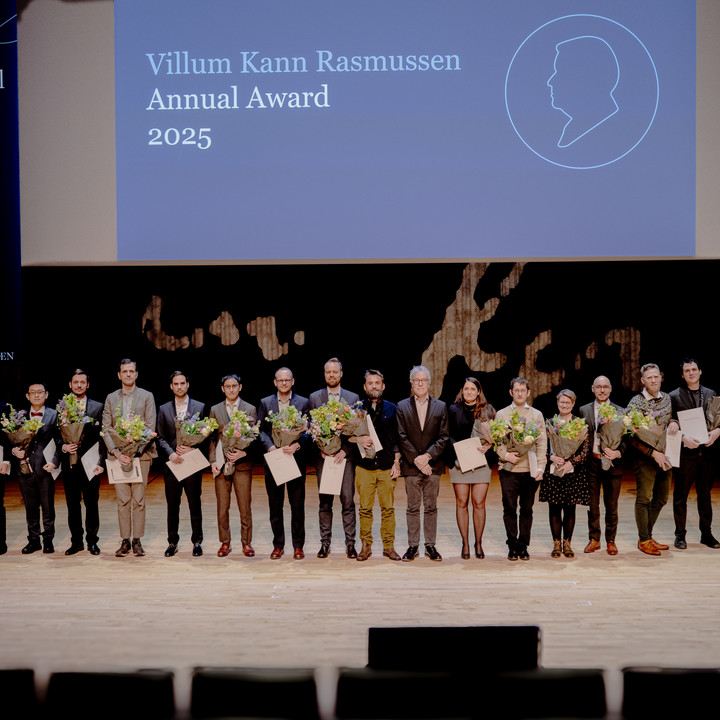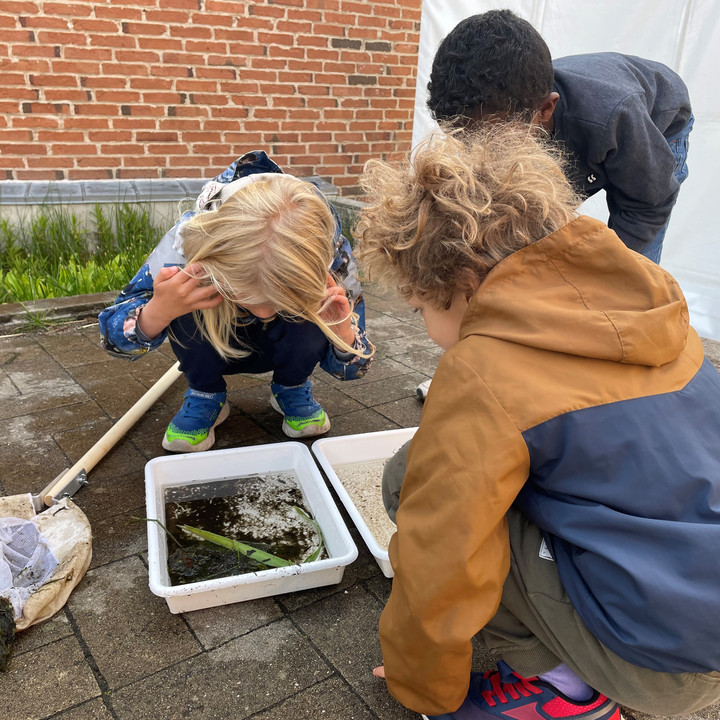17 million euros to advance vocational training for Europe’s digital and green transitions
"Vocational education is a cornerstone in Europe’s journey toward a greener and more digital society. These projects were chosen for their potential to provide essential skills while inspiring confidence and ambition in young people to lead this transformation,” says Nicolas Schunck, Grant area Director at Villum Foundation.
A total of thirteen projects have received funding – ranging from initiatives supporting NEETs (youth not in education, employment or training), to projects aimed at developing eco-friendly and digital practices in education and training.
Education as a lever for inclusion
Many of the projects focus on supporting vulnerable and at-risk youth in accessing education and enable their direct transition into employment.
“Integrating young people into education and employment goes beyond equipping them with technical skills. It also requires fostering their self-confidence and developing essential soft skills. The selected projects will explore diverse approaches tailored to specific target groups, generating valuable insights into effective methods and activities,” says Nicolas Schunck.
For example, the Ecole Gustave in France will open three new campuses in Paris, Lyon and Marseille dedicated to the training of young people in the energy renovation profession. The campuses will target young people who have dropped out of the traditional schooling system. They will be trained in skills such as energy performance methods, eco-construction, and understanding ecological standards.
“The initiative is part of a broader strategy to address the critical shortage of skilled workers in these high-demand fields. With the grant from Villum Foundation, we will be able to pursue this strategy and offer young people who have dropped out of traditional schooling systems a second chance at education,” says Marie Blaise, Co-founder and Director of Ecole Gustave.
In Italy, several projects target the regions of Sicily and Apulia and are based on innovative approaches to meet the challenges of school dropout rates and socio-economic conditions. The initiatives aim to address educational and social disparities by motivating and equipping young people with the skills needed to build brighter futures.
One example is the RiseVET project, organized by the CEIPES ETS (International Centre for the Promotion of Education and Development). The non-profit based in Palermo works to enhance student skills and prevent school dropouts through engaging and innovative teaching methods and facilities, in close collaboration with the local community and authorities.
“The grant from Villum Foundation will allow us to establish three new teaching laboratories – RiseLabs – in strategically selected VET schools across Sicily. It will strengthen our efforts to implement dropout prevention strategies and enhance educational pathways for students in the region considerably,” says Musa Kirkar, Director of CEIPES ETS.
“By funding innovative and inclusive education programs in regions with potential for development, we aim to support a strong European community, where young Europeans are empowered to face future challenges,” says Nicolas Schunck.
The projects are funded through the Villum Foundation European Youth and Education Grant Area.
The Villum Foundation’s grant area European Youth and Education is dedicated to empowering young Europeans to meet the challenges of the future. The aim is to support the enhancement of young peoples’ skills for the evolving job market with a focus on the green and digital transitions. Special attention is paid to ensuring that vulnerable youth also receive support to actively participate in society and become self-reliant citizens.
In even years, the foundation supports projects in France and Italy, while in odd years, it funds projects in Czechia, Hungary, Poland and Slovakia.
Next grant calls in France and Italy open in September 2025 with application deadlines in 2026.
Read more aout the European Youth and Education Grant Area (EYE) here
Read more about the projects:
The Digital Horizons project aims to improve the socioeconomic inclusion of newly arrived migrant and refugee youth aged 16-25 in Piemonte and Friuli Venezia Giulia in Italy. By partnering with certified Vocational Education and Training (VET) and Public Employment Services providers, employers, and non-profits, the project will strengthen existing IT skills development schemes embedded within national employment policies (GOL) to be industry-aligned and inclusive for migrants.
Organization: International Rescue Committee Italy
Italy
EUR 0,5 million
The CareSphere project aims to transform education in the care services sector through innovative pedagogy and cutting-edge technology in the Provence-Alpes-Côte d'Azur region in France. By merging physical and virtual environments, the initiative enhances training quality while integrating eco-friendly and digital practices. CareSphere features immersive simulations, workshops, and online courses to enrich the skills of students, trainers, and professionals. CareSphere tackles challenges such as the low appeal of care professions, skills shortages, and the need for sustainable and digital integration. Objectives include boosting student engagement, improving training quality, and embedding sustainable practices. Activities involve partnering with institutions, building the CareSphere lab, training trainers in new technologies, developing innovative modules, and conducting experiments.
Organization: Chamber of Commerce and Industry Nice Côte d'Azur
Italy
EUR 0,6 million
The LIGHT project aims to bridge the education gaps in Catania’s Librino district and Caltagirone, Sicily, Italy. By improving teacher competencies and engaging students through innovative curricula and practical experiences, the project aims to equip young people with the skills and motivation needed to succeed in the evolving job market and contribute to societal challenges, particularly in environmental protection and digital innovation. Integrating these elements into the educational framework will help produce a workforce that is not only proficient in new technologies but also committed to sustainable practices. The project seeks to create a sustainable and replicable model for systemic change.
Organization: Fondazione AVSI
Italy
EUR 1 million
The RiseVET project aims to equip students with new skills and introduce them to emerging professions in the labour market related to the twin transition in the Sicilian region in Italy. The project builds on the success of the existing RiseLab facility in Palermo and seeks to scale and replicate it in schools throughout the region. A dedicated project line addresses the school dropout phenomenon by facing it through school and work orientation activities for students, engagement with families and teachers to expand the educational community, and the active involvement of students in creating RiseLabs. Additionally, the project will feature a dedicated dialogue section on a newly developed app. For this purpose, teachers will be trained in non-formal education, career guidance techniques, and the use of RiseLab facilities to help prevent dropout. Lastly, the project will also enhance the skill levels of students, making them more prepared for careers related to the twin transition.
Organization: CEIPES ETS
Italy
EUR 1,2 million
The project takes place in two priority urban districts of Lille Metropole in France. La Fabrique de l'Emploi aims to set up an innovative vocational training and peer-to-peer tutoring programme for young jobseekers to reintegrate them into the labour market. The target group is mainly young people who are not in education, employment, or training (NEET). The courses provide technical skills in decarbonising buildings, as well as social skills in the workplace. Most of the training takes place as company training modules on worksites covered by contracts awarded under social clauses to Fabrique de l'Emploi or to integration projects. On the sites, the tutors are employees of La Fabrique de l'Emploi, all former long-term jobseekers living in the project area. This project creates mutual recognition between people in difficulty from the same neighbourhood, recreating an intergenerational social link through work.
Organization: La Fabrique de l'Emploi
France
EUR 1,2 million
The SEEDS project aims to promote the professionalisation of training paths that can contribute to raising awareness, advocating against, and promoting mitigation actions to climate change in the Bari-Cerignola region and in the Palermo-Catania region in Italy. The VET providers CNOS-FAP Puglia and CNOS-FAP Sicilia will enhance their educational offer based on supervision from universities. Concretely, two new educational paths will be created while at the same time raising awareness of institutions and the entire community on the issues of sustainability and legality.
Organization: Salesiani per il Sociale
Italy
EUR 1,4 million
The overall aim of the project is to raise the quality of vocational education in the Apulia region in Italy by strengthening staff skills through blended teacher learning courses and updating the training facilities with a focus on STEM and the green transition. The actual training modules will be designed with input from relevant public and private stakeholders. The courses have a progressive and cumulative learning outcome structure, consistent with a certification and micro-credential approach. The expected products are the development of training units, including learning materials, the renewal of the learning spaces to be more sustainable and energy efficient, as well as the creation of some outdoor green education laboratories, all of which will be provided with new equipment.
Organization: Scuola Centrale Formazione
Italy
EUR 1,5 million
The ECHO B.I.O project takes place in Mouchard in Eastern France. The project aims at promoting innovation and research in the field of green building through two main components: 1) creation of a centre of excellence for professional training in building trades in the areas of ecological, energy, and digital transition. The centre will be a collaborative space for researchers, trainers, learners, and professionals to develop new technologies and sustainable practices in construction. The goal is to advance the state of knowledge on the in-situ and long-term performance of these materials (efficiency, longevity, health impacts), as well as their social benefits (local economic development, circular economy). 2) Setting up a National Engineering and Pedagogical Innovation Laboratory, dedicated to experimenting with new pedagogical approaches that integrate the challenges of the green and digital transition.
Organization: Fédération Compagnonnique Nationale
France
EUR 1,5 million
The project aims to design and implement new free training courses for socially disadvantaged people, with a special focus on migrants in the Lombardo region in Italy. As a VET school, ASLAM will offer orientation activities and design new professional training courses aimed at obtaining a professional qualification, accompanying the social integration of the new migrants through linguistic training, development of active citizenship skills, green and digital skills, safety at work, and technical skills. To do this, ASLAM will structure a network for reception communities, provincial education centres, municipalities, and other social associations.
Organization: ASLAM Cooperativa Sociale
Italy
EUR 1,5 million
The project aims to ensure that the twin transition does not create a gap between the north and south of Italy. To ensure this, the project has two overall goals: The first goal is to enhance La Cometa Società Cooperativa Sociale’s (Oliver Twist School) education ecosystem in an innovative and inclusive way by the acquisition of digital and environmental skills and technology tools for both students and teachers. The expected results are that students acquire relevant skills for the job market, increase efficiency, and increase the use of digital tools. The second goal is to strengthen and extend the educational model. As part of the second goal, the education model will transfer know-how to Scuola del Fare by promoting a mutual exchange of knowledge.
Organization: La Cometa Società Cooperativa Sociale
Italy
EUR 1,6 million
The project aims to establish a training facility in Marseilles, France, focused on VET professions related to heritage and eco-construction. This includes site restoration and development. The project will unite stakeholders in the energy transition trades sector to share skills needs and raise youth awareness. The project additionally aims to create a trainers’ training programme for solar energy as a pilot VET track, which will have pedagogical transferability to other energy-related education areas. Where applicable, the project will seek to formalise the energy transition trade education programmes by seeking national accreditation. The overall expected results thus include the development of tailored training pathways for emerging professions, increased employment opportunities in sustainable sectors, and the dissemination of knowledge and practices beyond the project's anchoring.
Organization: Bao Formation
France
EUR 2 million.
The project Gustave Green Transition Academy will open three new campuses dedicated to the training of young people in the energy renovation professions. With the launch of energy transition academies in Paris, Lyon, and Toulouse, the project will train young people in renovation technologies covering renewable energies, energy performance methods, eco-construction, and understanding ecological standards. The campuses will target young people who have dropped out of the traditional schooling system and introduce them to the skills of tomorrow's technicians. Campus activities include raising awareness and introducing careers in the ecological transition, multitrade training courses, promoting mobility from other cities, and involving professionals and their equipment in training.
Organization: Ecole Gustave
France
EUR 2,2 million
The project aims to design and develop a comprehensive VET program that prepares young people to meet and/or anticipate the demands of the job market, especially in green, sustainability, and digital fields. The main project objective is to bridge the gap between the specific skills of young people and the needs of businesses in terms of sustainability within Apulia region in Italy. By offering a specialised training course focused on digital skills as well as social and environmental knowledge, the consortium aims to cultivate an ecosystem of sustainability managers equipped with the skills and practical experience necessary to approach and lead sustainable change within businesses.
Organization: Project School Campi Salentina
Italy
EUR 0,5 million.



